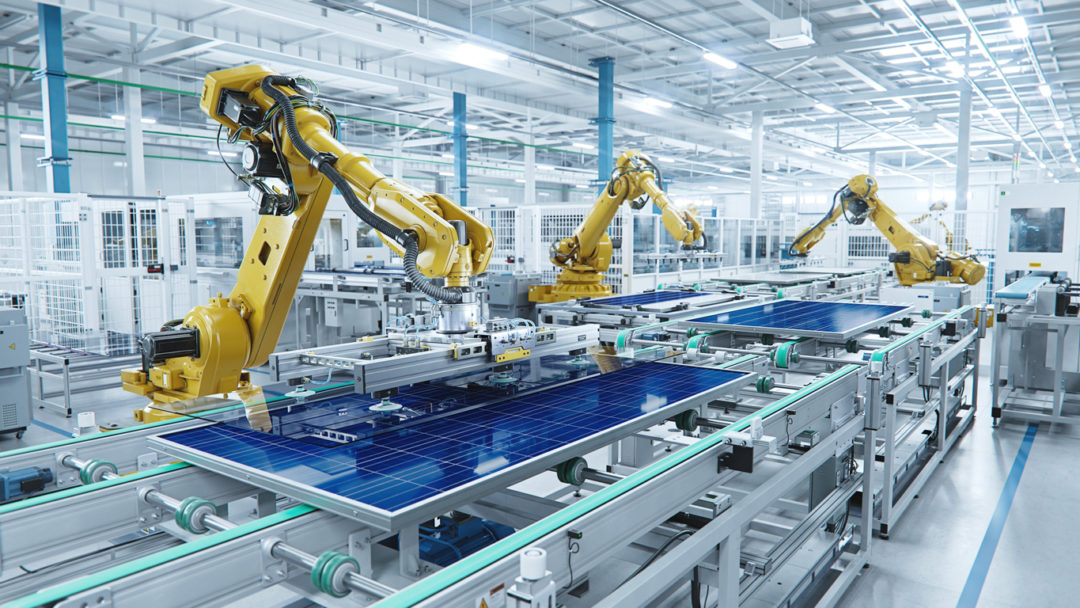
The manufacturing sector is experiencing a major shift due to the growing implementation of artificial intelligence (AI) in a number of production processes. reports that the global market for AI in manufacturing is poised for rapid growth, with its value expected to surge from $3.8 billion in 2023 to $156.
1 billion by 2033, reflecting a compound annual growth rate (CAGR) of 45%. What’s fueling this substantial growth? AI is playing an increasingly vital role in improving manufacturing efficiency, precision and decision-making. AI-driven technology is increasingly finding its way into the manufacturing industry, enhancing the effectiveness of 3D simulation software.

Digital twin-based 3D simulations are boosting efficiency throughout factory operations. This technology creates a comprehensive replica of individual processes and the interactions between all machinery, including robotics and collaborative robots (cobots). It allows users to test different layouts and configurations in a safe, virtual environment before implementing them in the actual production setting.
AI provides its value here because it can identify faults during the simulated production process, such as defects in parts or materials that could otherwise go unnoticed. If these issues aren’t caught, they could result in the mass production of flawed items, leading to costly waste and the disposal of materials, potentially in landfills. This not only incurs unnecessary expenses but also harms a manufacturer’s environmental, social and governance (ESG) performance.
In another benefit, AI’s capability to instantly process large volumes of data enables it to anticipate bottlenecks or inefficiencies before they arise, facilitating proactive adjustments and better decision-making. For instance, it might identify an automated guided vehicle (AGV) taking an unnecessarily long route when moving pallets from a warehouse section to a production line, allowing for a more efficient path to be implemented. If the AGV can take a quicker path to its end goal, this seemingly minor alteration can make a huge impact in getting items into production sooner, and into the supply chain for end sale.
It also has sustainable benefits for the organization due to the energy saved. AI’s capabilities can also be leveraged during the proposal development phase. By using AI-powered simulation software, users can quickly and easily design a more efficient production process, enabling them to share innovative new plans or ideas with colleagues or clients at the earliest possible stage.
AI can also help bridge the in the manufacturing industry. With the sector in the U.S.
expanding rapidly, an estimated million new employees will need to be recruited by 2033 to meet demand. If the talent shortage isn't addressed, nearly half of these positions could go unfilled, creating significant productivity and growth concerns for the sector. Historically, advanced tools and technologies in manufacturing, such as 3D simulation software and complex programming interfaces, have required skills that only specialized workers possessed.
Instead of replacing human talent, AI can make it easier for more people to learn and adopt these new technologies. AI-powered user interfaces provide intuitive, guided experiences that enable workers with limited technical knowledge to effectively use advanced tools. By correcting mistakes and providing explanations, AI helps speed up the learning process for graduates and less experienced employees.
This empowers them to take on more complex roles while also fostering a culture of continuous improvement and learning throughout the organization. The adoption of AI in the manufacturing industry is proving to have a significant impact, revolutionizing production methods. With forecasts pointing to significant growth in the AI manufacturing market, it's evident that AI will increasingly play a crucial role in boosting accuracy and decision-making within the sector.
By integrating with 3D simulation software, AI allows manufacturers to streamline processes, minimize waste and innovate in previously unthinkable ways. But AI’s influence goes beyond just technological progress. The pressing skills gap in the industry, which will become wider in the coming years without mitigating action, can be addressed by the growing capabilities of AI.
By making advanced tools more accessible and easier to use, AI enables a wider range of workers to engage in and contribute to complex manufacturing tasks. This leads to greater productivity and fosters a culture of continuous learning and development, ensuring that the wider workforce keeps pace with the industry's technological advancements. As AI continues to spread throughout the manufacturing sector, its impact will only intensify.
This growing trend will set the stage for smarter, more efficient and more sustainable manufacturing practices..













